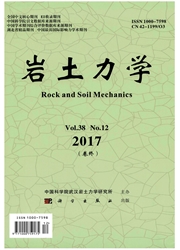

 中文摘要:
中文摘要:
以积水条件下Green-Ampt入渗模型为基础,拓展其在变雨强中入渗率和累积入渗量计算形式。结合上述理论基础,选用饱和-非饱和土壤水、热和溶质运移模拟软件Hydrus-1D,探讨了常降雨与变雨强的入渗差异和饱和导水率、土壤类型对变雨强入渗过程的影响。研究表明:相对于常降雨,变雨强更利于雨水入渗,累积入渗量显著增加;其他水力参数不变,饱和导水率越大,入渗率与变雨强随时间变化曲线重合率越高,雨强控制时间越长,累积入渗量相应也越大;其他水力参数作用效果不容忽视,其影响作用可与饱和导水率达到相似效果。正确了解变雨强下入渗过程及影响因素,有助于准确地把握实际降雨入渗情况,对指导水力工程有重要的实际意义。
 英文摘要:
英文摘要:
Under the foundation of Green-Ampt infiltration model established upon ponding condition, we expand it useful to calculate infiltration rate and cumulative infiltration in the variable rainfall intensities. Combined with the theoretical basis, we discuss the differences between constant rainfall intensity with variable rainfall intensity and the effect of saturated hydraulic conductivity and soil types on the infiltration process under variable rainfall intensities based on the saturated-unsaturated flow software Hydrus-1D. Research shows that: compared with constant rainfall intensity, variable rainfall intensities is more easily from the point of the rain infiltration; and the cumulative infiltration increases significantly. When other hydraulic parameters unchange, the larger the saturated hydraulic conductivity is, the coincidence rate of the curve of infiltration rate and variable rainfall intensity changing with time is higher. And the control time of rainfall intensity and the cumulative infiltration are larger accordingly. Other hydraulic parameters effects cannot be ignored; because the effect of them on infiltration can achieve similar to saturated hydraulic conductivity. Correctly understanding infiltration process and influential factors of rainfall infiltration upon the variable rainfall intensity will help us to accurately grasp the actual situation. So it has important practical significance to guide hydraulic engineering.
 同期刊论文项目
同期刊论文项目
 同项目期刊论文
同项目期刊论文
 期刊信息
期刊信息
